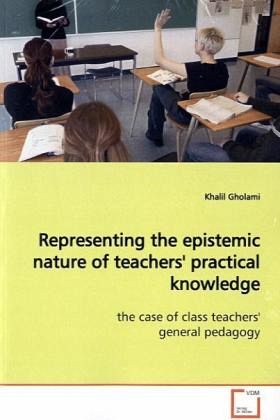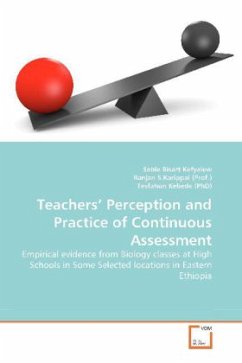
Representing the epistemic nature of teachers' practical knowledge
the case of class teachers' general pedagogy
Versandkostenfrei!
Versandfertig in 6-10 Tagen
51,99 €
inkl. MwSt.

PAYBACK Punkte
26 °P sammeln!
This book draws on findings from an empirical studyon the epistemic nature of the teachers practicalknowledge. Teachers practical knowledge is definedas all teachers cognition (e.g., beliefs, values,motives, procedural knowing, and declarativeknowledge) that guide their practice of teaching.Teachers, are believed, to develop their practicalknowledge through professional experience andrefection on it. Drawing on qualitative data gatheredfrom 6 class teachers in Helsinki, the researchidentified that the teachers practical knowledgesustains two epistemic statuses: praxial andpracticable knowledge...
This book draws on findings from an empirical study
on the epistemic nature of the teachers practical
knowledge. Teachers practical knowledge is defined
as all teachers cognition (e.g., beliefs, values,
motives, procedural knowing, and declarative
knowledge) that guide their practice of teaching.
Teachers, are believed, to develop their practical
knowledge through professional experience and
refection on it. Drawing on qualitative data gathered
from 6 class teachers in Helsinki, the research
identified that the teachers practical knowledge
sustains two epistemic statuses: praxial and
practicable knowledge. This book discusses the
epistemic weights associated with the teachers
praxial and practicable knowledge. It particularly
addresses how teachers praxial and practicable
knowledge and their corresponding epistemic values as
a philosophical base serve to clarify the normative
and descriptive dimensions of teaching.In a more
general view, this book discusses the philosophy of
teaching from an epistemological perspective.
on the epistemic nature of the teachers practical
knowledge. Teachers practical knowledge is defined
as all teachers cognition (e.g., beliefs, values,
motives, procedural knowing, and declarative
knowledge) that guide their practice of teaching.
Teachers, are believed, to develop their practical
knowledge through professional experience and
refection on it. Drawing on qualitative data gathered
from 6 class teachers in Helsinki, the research
identified that the teachers practical knowledge
sustains two epistemic statuses: praxial and
practicable knowledge. This book discusses the
epistemic weights associated with the teachers
praxial and practicable knowledge. It particularly
addresses how teachers praxial and practicable
knowledge and their corresponding epistemic values as
a philosophical base serve to clarify the normative
and descriptive dimensions of teaching.In a more
general view, this book discusses the philosophy of
teaching from an epistemological perspective.












